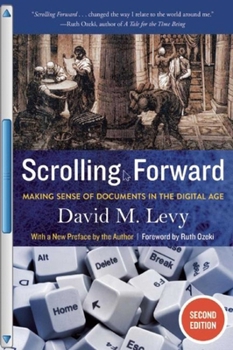Scrolling Forward: Making Sense of Documents in the Digital Age
Select Format
Select Condition 
Book Overview
A fascinating, insightful, and wonderfully written exploration of the document. Like Henry Petroski's The Pencil , David Levy's Scrolling Forward takes a common, everyday object, the document, and... This description may be from another edition of this product.
Format:Paperback
Language:English
ISBN:1628723270
ISBN13:9781628723274
Release Date:January 2016
Publisher:Arcade Publishing
Length:276 Pages
Weight:1.00 lbs.
Dimensions:0.8" x 6.0" x 8.9"
Customer Reviews
5 ratings
Is paper to disappear?
Published by Thriftbooks.com User , 20 years ago
The changing face of documents and images in the digital age is considered in a title which covers all kinds of documents and the changes they face from the digital world; from recipes and letters to business memos and other writings. Is the book doomed? Is paper to disappear? Scrolling Forward: Making Sense Of Documents In The Digital Age by David M. Levy examines documents of all kinds as they relate to culture, history and technological changes.
Documentation for our times
Published by Thriftbooks.com User , 20 years ago
This meditation on the changing role of documents in our lives is simply marvelous--wide-ranging, literate and even profound. Levy is no Luddite--quite to the contrary--but his essays here will change the way you think about the digital revolution. I might add that the prose is a model of what writing of this kind should be: modest, inviting and free of academic jargon or posturing. Nicely done.
Intelligent, well-written and on point
Published by Thriftbooks.com User , 22 years ago
...Our complicated relationship with documents--everything from Post-Its to encyclopedias--is the subject of David Levy's "Scrolling Forward." Levy, a doctoral computer scientist and calligrapher, is well placed to compare the old and new. His book is organized around broad subjects--reading, writing and the like--but each chapter is a meditation, written more on the "this reminds me of that" principle, than according to something more formal. Such an approach can occasionally get out of control, but at its best the book's style effectively juxtaposes printed and electronic documents and calculates the gains and losses of moving information from one medium to the other. The fact that Levy is interested in this question indicates a growing maturity in our attitudes toward digital materials. A decade ago, the first important works on hypertext and multimedia--George P. Landow's "Hypertext" and Jay David Bolter's "Writing Space"--declared that, thanks to the computer, the author was dead, the reader reigned supreme, the book was doomed and linear thinking was passe. They were widely praised within academic circles and provoked defenders such as Sven Birkerts to assert the eternal value of the book. The debate that has followed has largely been beside the point, because it misses several things that Levy wisely considers in depth. First, arguments over "the future of the book" focus on books, particularly high literature. But we live in a world saturated with texts: We might not read Dante every today, but we'll read street signs, scan newspapers, select from restaurant menus, answer e-mail, ignore ads, type URLs. To drive the point home, "Scrolling Forward" begins not with a discussion of encyclopedias or the Bible, but with a deli receipt. Even something so utterly inconsequential turns out to draw upon thousands of years of history and complex social institutions, not to mention a host of technologies. "Over the centuries a complex network of institutions and practices has grown up to create and maintain meaningful and reliable paper documents," Levy argues. This is as true of receipts as it is of Rilke: "To be a receipt is to be connected to cash registers, sellers, buyers, products, expense reports, the IRS, and so on." It takes a village to make a document. Levy's receipt was a hybrid, a printed record generated by an electronic system; therein lies a second big point. It turns out that documents have sloshed between electronic and printed form for decades. Checks and airline tickets were computer-printed from the 1950s. Mainframe computer publishing systems were developed in the 1960s and 1970s for newspapers and other high-volume publishers. In the 1980s, word processors allowed writers to create digital texts. In the 1990s, Web browsers gave readers direct access to digital works. This last and most-publicized step was a culmination, not a revolution. Seen in this light, the whole print versus digital debate seems irrelevant. The fact that t
A fascinating survey of the future of documents
Published by Thriftbooks.com User , 22 years ago
Scrolling Forward is a very fine survey of the changing relationships between ordinary objects - in this case, documents - and modern digital influences. Writing, etiquette, and reading habits are being questioned and changed by new technologies and practices: this examines documents of all kinds, considering what is likely to change and what is/should be preserved in the Internet Age. A fascinating survey of the future of documents and their meaning.
Important Reading
Published by Thriftbooks.com User , 22 years ago
This is an important book for everyone involved in the so-called "digital revolution" (which probably means all of us). David Levy tells us that as we look forward we must also pay close attention to the past. We must understand the meaning of documents independent of their fixity (or lack thereof) in the bits flowing across networks or ink on paper. Each chapter provides a thoroughly unique approach to helping you understand the cultural wrappings and the hidden implications of changes in the vehicle for fixity. The chapter about a deli receipt is especially magnificent! Read this book and think deeply about it.





